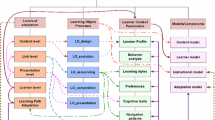Abstract
As e-Learning environments evolve, learners have become increasingly demanding on personalised learning which allows them to build their own knowledge pathway. This significant change in learning requirements imposes a new learning paradigm which ensures one-to-one learning with flexible mode of content configuration, and adaptive delivery and assessment. Although in the past years, Learning Management Systems (LMS) providers have upgraded system functionality to support instructional design for e-learning package, incorporating individual learners’ personal learning requirements in content design still remains challenging. To involve learners in the content design requires identification of their personal learning requirements. This paper presents a method for articulating individual learners’ learning requirements (e.g., learning styles, and prior knowledge), and representing them in a set of computable parameters in Learner’s Profile. These parameters will then be mapped onto instructional design strategies which determine a selection of suitable learning content and sequencing of content with adequate instruction in a learning package.
Access this chapter
Tax calculation will be finalised at checkout
Purchases are for personal use only
Preview
Unable to display preview. Download preview PDF.
Similar content being viewed by others
References
SCORM.: Best Practices Guide for Content Developers. Learning Systems Architecture Lab (2003), http://www.lsal.cmu.edu/lsal/expertise/projects/
IEEE.: Standard for Learning Object Metadata. Learning Technology Standards Committee, LTSC (2003), http://grouper.ieee.org/LTSC/wg12/
IMS.: IMS Open Specifications for Interoperable Learning Technology (2003), http://www.imsglobal.org/
Reiser, R.A., Dempsey, J.V.: Trends and Issues in Instructional Design and Technology. Prentice-Hall, New Jersey (2002)
Schuman, L.: Perspectives on instruction (1996), http://edweb.sdsu.edu/courses/edtec540/Perspectives/Perspectives.html
Honebein, P.C., Duffy, T., Fishman, B.: Constructivism and the Design of Learning Environment: Context and Authentic Activities for Learning. In: Duffy, T.M., Lowyck, J., Jonassen, D. (eds.) Design Environments for Constructivist Learning, pp. 87–108. Springer, New York (1993)
Peirce, C.S.: Collected Papers of Ch.S, Peirce, 1931 - 1935, edited by Hartshorne, C., Weiss, P. (1960) Cambridge, Mass (1932-1935)
Liu, K.: Semiotics in Information Systems Engineering. Cambridge University Press, Cambridge (2000)
Liu, K., Sun, L.: Applying Semiotics in Constructivist Learning. Keynote Paper. In: International Conference on Teaching and English Translation in the 21st Century, Marco Politechnique Institute, Marco (2002)
Bruner, J.: Toward a Theory of Instruction. Harvard University Press, Cambridge (1966)
Sun, L., Williams, S.: An Instructional Design Model for Constructivist Learning. Association for the Advancement of Computing in Education (AACE), Switcherland (2004) (accepted for publication)
Wiley, D.A.: Connecting learning objects to instructional design theory: A definition, a metaphor, and a taxonomy. In: Wiley, D.A. (ed.) The Instructional Use of Learning Objects (2000), http://reusability.org/read/chapters/wiley.doc
Cisco Systems, Inc. White Paper.: Reusable Learning Object Strategy v4.0 (2001), http://business.cisco.com
O’Connor, T.O.: Using learning styles to adapt technology for higher education (1999), http://www.indstate.edu/ctl/styles/main.html
Jung, C.G.: Psychological Types, Translation by H. Godwyn Baynes (1923), http://psychclassics.yorku.ca/Jung/types.htm (1921)
Briggs, K. C., Myers, I. B.: Myers-Briggs Type Indicator Form G question booklet and response form (1976)
Sun, L., Williams, S., Ousmanou, K., Lubega, J.: Building Personalised Functions into Dynamic Content Packaging to Support Individual Learners. In: 2nd European Conference on e-Learning 2003, Glasgow, Scotland (2003) ISBN: 0-9544577-4-9
IEEE PAPI.: PAPI Learner Specification (2002), http://edutool.com/papi/
IMS LIP.: Learner Information Package specification (2001), http://www.imsglobal.org/profiles/index.cfm
Author information
Authors and Affiliations
Editor information
Editors and Affiliations
Rights and permissions
Copyright information
© 2004 Springer-Verlag Berlin Heidelberg
About this paper
Cite this paper
Sun, L., Ousmanou, K., Williams, S. (2004). Articulation of Learners Requirements for Personalised Instructional Design in e-Learning Services. In: Liu, W., Shi, Y., Li, Q. (eds) Advances in Web-Based Learning – ICWL 2004. ICWL 2004. Lecture Notes in Computer Science, vol 3143. Springer, Berlin, Heidelberg. https://doi.org/10.1007/978-3-540-27859-7_55
Download citation
DOI: https://doi.org/10.1007/978-3-540-27859-7_55
Publisher Name: Springer, Berlin, Heidelberg
Print ISBN: 978-3-540-22542-3
Online ISBN: 978-3-540-27859-7
eBook Packages: Springer Book Archive




